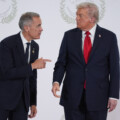Welcome to Need to Know, The Hub’s roundup of experts and insiders providing insights into the developments Canadians need to be keeping an eye on.
Today’s weekend edition dives into thought-provoking research from think tanks, academics, and leading policy thinkers in Canada and around the world. Here’s what’s got us thinking this week.
Well, we’ve survived a few more weeks without President Trump implementing economically devastating tariffs on Canada. It’s increasingly clear that the best words to describe what we can expect from the remaining three years and 49 weeks of Trump’s second term are “uncertainty” and “chaos.” If Trump is willing to tariff his top two trading partners, who’s to say he won’t also put tariffs on America’s other allies like E.U. countries? In fact, he’s already mused about it. America’s long-term allies are now in a world of preparing for the worst and hoping for the best.
Put simply, the probability that there will be a full-fledged global trade war in the next few years is no longer trivial and is rising. With that in mind, let’s take a look at some research that has tried to quantify just how economically damaging a global trade war would be.
The economic pain of a global trade war
How much would a global trade war cost? Research by Indiana University professor Ahmad Lashkaripour, published in the Journal of International Economics, presents a novel approach to measuring the economic impact of a global tariff war, where multiple countries raise their import tariffs. He finds that the cost of these conflicts has more than doubled over his 15-year sample—from 2000 to 2014–with small, trade-dependent economies being the most vulnerable.
His model assumes that countries apply different tariff rates in the event of a global trade war, based on their economic composition. Overall, Lashkaripour assesses tariff war consequences across 44 countries and 56 industries.
He finds that a global tariff war could shrink the average country’s real GDP by 2.8 percent, with the total global cost amounting to $1.7 trillion in 2014—comparable to the entire economic output of South Korea.
In addition, small, downstream economies, such as Estonia and Latvia, would be disproportionately affected due to their reliance on imported intermediate goods. The potential worst-case scenario of GDP losses for these countries could exceed 10 percent.
The estimates for Canada are that real GDP would fall by 2.76 percent. Recall that Canada’s GDP fell by 5.2 percent during the COVID-19 pandemic, and the rebound from that shock was relatively quick once the economy was reopened. As University of Toronto economist Joseph Steinberg lays out in a recent Hub article, a prolonged trade war would see deleterious economic consequences lasting for years, meaning that the economic damage from a global trade war would be far greater than the pandemic.









